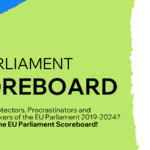This morning European leaders meeting at the European Council in Brussels agreed on a proposal for a new set of climate and energy targets for 2030. CAN Europe [1] is disappointed by their failure to adequately increase the levels of ambition for action on greenhouse gas emission reductions, renewable energy and energy savings.
Clearly, this decision does not respond to the urgency to act on climate change as reflected in the latest report of the Intergovernmental Panel on Climate Change, which will be finalised next week [2]. Nor does it give the necessary incentives to Europe’s industry to invest in low-carbon technologies and reap the full economic and employment benefits of such investments. More ambitious renewable energy and energy savings targets would also substantially increase Europe’s energy independence and be one of the best responses to dealing with Russia’s threats towards the Ukraine and the EU.
This decision is the first step in a longer process. Further work needs to start now to develop legislative proposals that will greatly increase Europe’s ambitions to reduce greenhouse gas emissions, increase renewable energy and promote energy savings. An improved proposal will be crucial for the EU’s ability to negotiate an adequate international agreement with strong commitments from all major emitters, by the end of the climate talks in Paris in December 2015.
Commenting on the at least 40% greenhouse gas emission reduction target, Wendel Trio, director of Climate Action Network Europe said:
“Cutting carbon by at least 40% is clearly not in line with Europe’s ambition to decarbonise by 2050. The target will also fail to give the right incentives to Europe’s industry to invest in low-carbon technologies and reap the full economic and employment benefits of such investments. This target puts Europe at risk of being locked into a costly high-carbon energy infrastructure and catastrophic runaway climate change.”
“The European Commission must urgently act upon the “at least” placed in front of the 40%, and propose an increase to the emission reduction target. Only then can Europe show the world it is serious about climate action and help create positive momentum for the international climate negotiations.”
Commenting on the EU energy savings target, Wendel Trio, Director of Climate Action Network Europe, said:
“Unbelievably, Member States have further weakened and adopted a non-binding energy savings target of at least 27%. This will effectively slow down progress on energy savings after 2020 compared to current trends. By putting a leash on energy savings, they are losing out on increased energy security while throwing away cost-effective emission reductions and jobs growth in Europe.”
Commenting on the EU Renewable Energy Target, Wendel Trio, Director of Climate Action Network Europe, said:
“The 27% renewable energy target is a clear setback from the policies and development that are currently in place, implying a dramatic slow down in the growth of renewable energy [3]. Its a weak target that fails to recognise the on going transformation of our energy system being championed by citizens and many industrial sectors.”
“The low EU renewables target – not accompanied by national binding targets – means Europe risks missing out on the potential benefits that further development of the renewable energy industry would have for Europe’s economy, its people and climate.”
Contacts
Wendel Trio, Director of CAN Europe – wendel@caneurope.org, +32.473.17.08.87
Matthew Keys, Communications Manager – matthew@caneurope.org, +32.497.700.372
Policy experts are available for detailed analysis on request.
Notes
1. Climate Action Network (CAN) Europe is Europe’s largest coalition working on climate and energy issues. With over 120 member organisations in more than 25 European countries, CAN Europe works to prevent dangerous climate change and promote sustainable climate and energy policy in Europe.
2. The 40th Session of IPCC (adoption and approval of SYR AR5) will be held in Copenhagen, Denmark between 27-31 October 2014 – http://www.ipcc-syr.nl/
3. From 6.4% per cent per year between 2010 and 2020 to 1.4% per cent per year, between 2020 and 2030 (source: Greenpeace, based on European Commission data).

